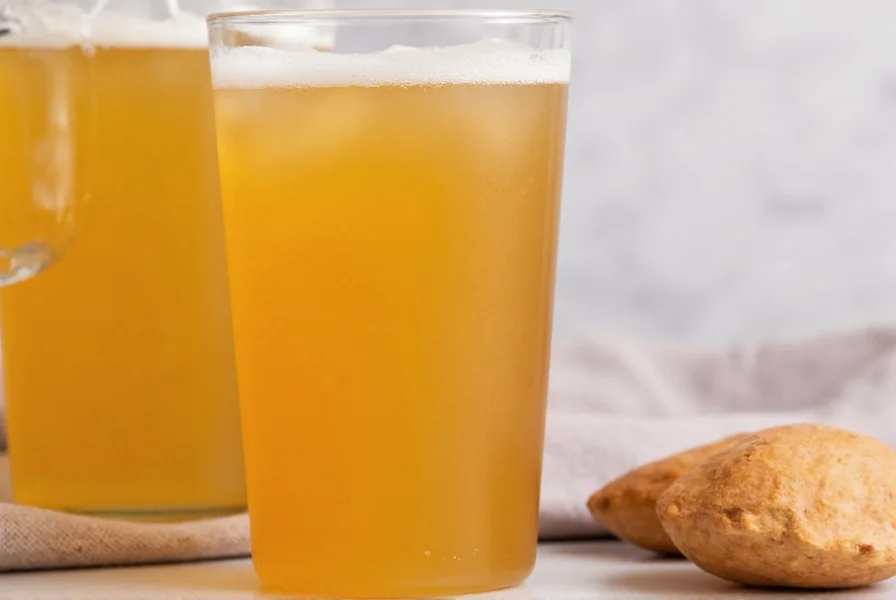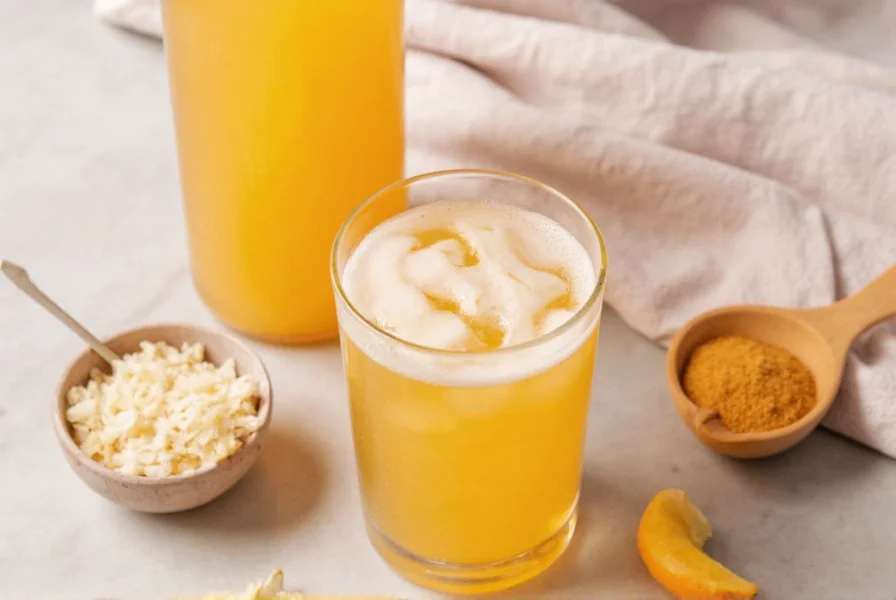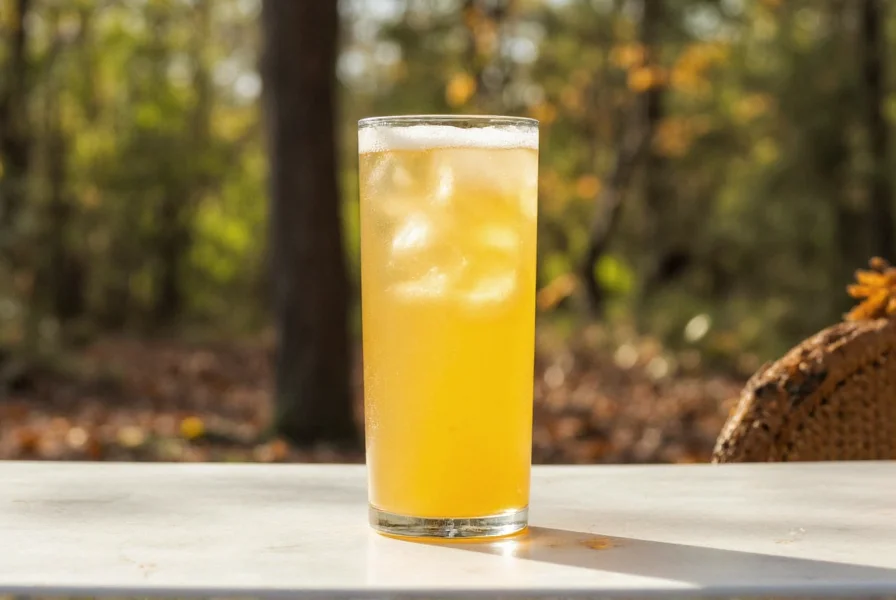What Exactly Is Ginger Kombucha?
Ginger kombucha represents one of the most popular flavor variations of traditional kombucha, combining the ancient fermented tea beverage with fresh ginger root. This distinctive version maintains kombucha's characteristic tangy profile while introducing ginger's warming, spicy notes and additional health properties. The fermentation process involves a symbiotic culture of bacteria and yeast (SCOBY) working with sweetened tea, with fresh or dried ginger added during the secondary fermentation stage to develop its signature flavor and enhanced benefits.
The History Behind This Flavorful Fusion
Kombucha itself has roots tracing back over 2,000 years to ancient China, where it was known as the "tea of immortality." Ginger has an equally impressive history, valued across multiple ancient cultures for its medicinal properties. The combination of these two powerful ingredients emerged more recently as craft brewers and health-conscious consumers began experimenting with flavor variations. Modern ginger kombucha gained significant popularity during the early 2010s as the functional beverage market expanded and consumers sought natural alternatives to sugary sodas.
How Ginger Kombucha Is Made: The Fermentation Process
The production of ginger kombucha follows the standard kombucha brewing process with a crucial addition. First, a base kombucha is created by fermenting sweetened black or green tea with a SCOBY for 7-14 days. During the second fermentation stage, freshly grated ginger or ginger juice is introduced along with potential additional flavorings. This secondary fermentation, typically lasting 2-7 days, allows carbonation to develop while the ginger infuses its distinctive flavor and compounds into the beverage. The ginger content usually ranges from 1-3% by weight, though artisanal producers may use higher concentrations for more intense flavor profiles.
| Characteristic | Ginger Kombucha | Regular Kombucha |
|---|---|---|
| Primary Flavor Notes | Spicy, warming, citrusy | Vinegary, earthy, tart |
| Ginger Content | 1-5% by weight | None |
| Digestive Benefits | Enhanced by ginger's properties | Standard probiotic benefits |
| Secondary Fermentation Time | 3-7 days | 2-5 days |
Nutritional Profile and Potential Health Benefits
Ginger kombucha delivers a unique nutritional profile that combines the benefits of both ingredients. A typical 8-ounce serving contains approximately 30-60 calories, 2-6 grams of sugar (depending on fermentation time), and 1-2 grams of protein. The beverage contains probiotics from the fermentation process along with gingerol, the active compound in ginger responsible for many of its health properties.
Research suggests ginger kombucha may offer several potential benefits. The probiotics support gut health and digestion, while ginger's anti-inflammatory properties may help reduce nausea and muscle pain. A 2022 review in the Journal of Functional Foods noted that the combination creates synergistic effects greater than either ingredient alone, particularly for digestive health. However, most studies remain preliminary, and more human clinical trials are needed to confirm specific health claims.

Taste Profile and Sensory Experience
Ginger kombucha offers a complex sensory experience that distinguishes it from regular kombucha. The initial taste presents kombucha's characteristic tartness, quickly followed by ginger's warming spice that builds gradually rather than hitting immediately. High-quality ginger kombucha maintains a delicate balance where neither the vinegar notes nor the ginger overpowers the other. The carbonation level typically ranges from light to moderate, creating a refreshing mouthfeel. Temperature significantly affects the tasting experience—serving it slightly chilled (around 45°F/7°C) enhances the refreshing qualities while allowing the ginger notes to shine through without becoming overwhelming.
Safety Considerations and Who Should Be Cautious
While ginger kombucha is generally safe for most adults, certain individuals should exercise caution. People taking blood thinners should consult their healthcare provider before consuming significant amounts, as both ginger and kombucha can affect blood clotting. Those with compromised immune systems should ensure they're consuming commercially produced, pasteurized versions rather than homemade batches to avoid potential contamination risks. Individuals with acid reflux may find the combination of ginger and kombucha's natural acidity exacerbates their symptoms. As with any fermented beverage, starting with small servings (4-6 ounces) allows your body to adjust to the probiotic content.
How to Select Quality Ginger Kombucha
When choosing ginger kombucha, look for products with minimal added sugars—ideally less than 6 grams per serving. The best options list only tea, sugar, water, SCOBY, and ginger as ingredients, without artificial flavors or preservatives. Check for visible sediment at the bottom of the bottle, which indicates live cultures are present. Refrigerated products generally maintain higher probiotic counts than shelf-stable versions. Reading the nutrition label carefully helps identify products that haven't been over-fermented, which can result in excessive acidity that overwhelms the ginger flavor.

Understanding the Science Behind the Benefits
The potential health benefits of ginger kombucha stem from the synergistic interaction between its components. Ginger contains gingerols and shogaols, compounds with demonstrated anti-inflammatory and antioxidant properties. When combined with kombucha's acetic acid, gluconic acid, and various probiotic strains, these compounds may enhance each other's bioavailability and effectiveness. A 2023 study published in Food Microbiology found that the fermentation process actually increases certain bioactive compounds in ginger, potentially making them more readily absorbed by the body. However, researchers caution that individual responses vary significantly, and the beverage should be viewed as part of an overall healthy lifestyle rather than a standalone treatment for specific conditions.
Common Questions About Ginger Kombucha
Does ginger kombucha contain alcohol?
Commercially produced ginger kombucha typically contains less than 0.5% alcohol by volume, which is the legal limit for non-alcoholic beverages in most countries. The fermentation process naturally produces small amounts of alcohol, but reputable brands monitor and control this level carefully. Homemade versions may contain slightly higher alcohol content depending on fermentation time and conditions.
How much ginger kombucha should I drink daily?
Most health professionals recommend starting with 4-6 ounces once daily to assess your body's response. After establishing tolerance, many suggest limiting consumption to 8-16 ounces per day. People with sensitive digestive systems or specific health conditions may need to consume less. It's important to note that ginger kombucha should complement, not replace, water as your primary hydration source.
Can ginger kombucha help with digestion?
Both ginger and kombucha have properties that may support digestive health. Ginger has been traditionally used to alleviate nausea and improve gastric motility, while kombucha provides probiotics that can contribute to a healthy gut microbiome. A 2021 review in the Journal of Gastroenterology and Hepatology noted promising preliminary evidence, but emphasized that more rigorous human studies are needed to confirm specific digestive benefits.
Is ginger kombucha safe during pregnancy?
Pregnant women should consult their healthcare provider before consuming ginger kombucha. While small amounts of ginger are generally considered safe during pregnancy for nausea relief, the combination with kombucha's probiotics and trace alcohol content creates uncertainty. Most healthcare providers recommend limiting or avoiding kombucha during pregnancy due to the potential for unpasteurized products to contain harmful bacteria, though pasteurized commercial versions present lower risk.
How does ginger kombucha differ from ginger ale?
Ginger kombucha and ginger ale differ significantly in production and composition. Ginger ale is a carbonated soft drink typically made with carbonated water, high fructose corn syrup, and artificial ginger flavoring. Ginger kombucha is a naturally fermented beverage containing live cultures, with ginger as a primary natural ingredient. Kombucha generally has less sugar, contains probiotics, and offers potential health benefits that ginger ale lacks, though it has a more complex, less sweet flavor profile.











 浙公网安备
33010002000092号
浙公网安备
33010002000092号 浙B2-20120091-4
浙B2-20120091-4